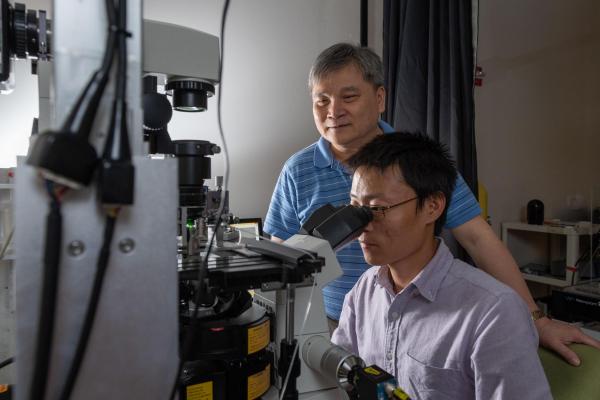As your immune cells travel through the gauntlet of organs and tissues via the blood and lymphatic circulation systems, doing the jobs their supposed to do, they are buffeted by myriad mechanical forces.
It’s a process that demands further exploration, and Cheng Zhu, Regents’ Professor and J. Erskine Love Jr. Endowed Chair in Engineering in the Wallace H. Coulter Department of Biomedical Engineering and a researcher in the Petit Institute for Bioengineering and Bioscience, is leading the expedition, studying how immune cells sense, respond to, and adapt to this dynamic, internal, and infinitesimal mechanical landscape.
And as an international authority in the nascent field of mechanoimmunology, Zhu was invited to share his research progress and his outlook in a new Perspective article for the journal Nature Immunology.
“This was an opportunity to review and summarize our work and those of others in the field, to describe our point of view, and identify some promising directions for research going forward,” said Zhu, lead author of the paper entitled, “Mechanosensing through immunoreceptors.” His co-authors are Wei Chen of Zhejiang University School of Medicine (Hangzhou, China, Georgia Tech graduate and former member of the Zhu lab); Jizhong Lou of the Chinese Academy of Sciences (Beijing, China, another former member of the Zhu lab); and two investigators from Zhu’s Cellular and Molecular Biomechanics Laboratory, William Rittase (postdoctoral researcher) and Kaitao Li (research scientist).
Lymphocyte recognition of “foreign” or “bad self” antigens is a crucial process in the initiation of adaptive immune responses against infections or cancer. The function of each immune cell is determined by the collective signals from various immunoreceptors, whose expression and activity are dependent on the developmental stages and environmental context of the cell.
Recent studies have highlighted the presence of mechanical force on several immunoreceptor-ligand pairs and the important role that this force plays in regulating the cells’ interaction and function. “This lays the foundation in the emerging field of mechanoimmunology,” says Zhu, whose team of researchers used the T-cell antigen receptor as an example through which they could review the current understanding of mechanosensing properties of immunoreceptors.
They explore the types of forces that immunoreceptors may encounter and the effects of force on ligand bonding, conformational change and the triggering of immunoreceptors, as well as the effects of force on the downstream signal transduction, cell-fate decisions, and the effector function of immune cells.
“We also highlight the novel biophysical tools and advanced imaging techniques that have helped in our understanding of the role of forces in immune cell functions,” says Zhu, who believes the new insights gained from further studies of immunoreceptor-mediated mechanosensing may have translational applications, including the development of anti-cancer vaccines, and more efficient cell-based treatments.
As Zhu points out, the molecular mechanism underlying the triggering of cancer-fighting CAR-T cells (chimeric antigen receptor T cells) is not fully understood, and that prevents them from achieving optimal efficacy. “What we learn going forward may be important in helping to design the next generation of CAR-T therapies, and further training the immune system to defend against cancer," he says. "Ultimately, it’s about saving lives.”
Media Contact
Jerry Grillo
Communications Officer II
Parker H. Petit Institute for
Bioengineering and Bioscience
Latest BME News
Jo honored for his impact on science and mentorship
The department rises to the top in biomedical engineering programs for undergraduate education.
Commercialization program in Coulter BME announces project teams who will receive support to get their research to market.
Courses in the Wallace H. Coulter Department of Biomedical Engineering are being reformatted to incorporate AI and machine learning so students are prepared for a data-driven biotech sector.
Influenced by her mother's journey in engineering, Sriya Surapaneni hopes to inspire other young women in the field.
Coulter BME Professor Earns Tenure, Eyes Future of Innovation in Health and Medicine
The grant will fund the development of cutting-edge technology that could detect colorectal cancer through a simple breath test
The surgical support device landed Coulter BME its 4th consecutive win for the College of Engineering competition.








